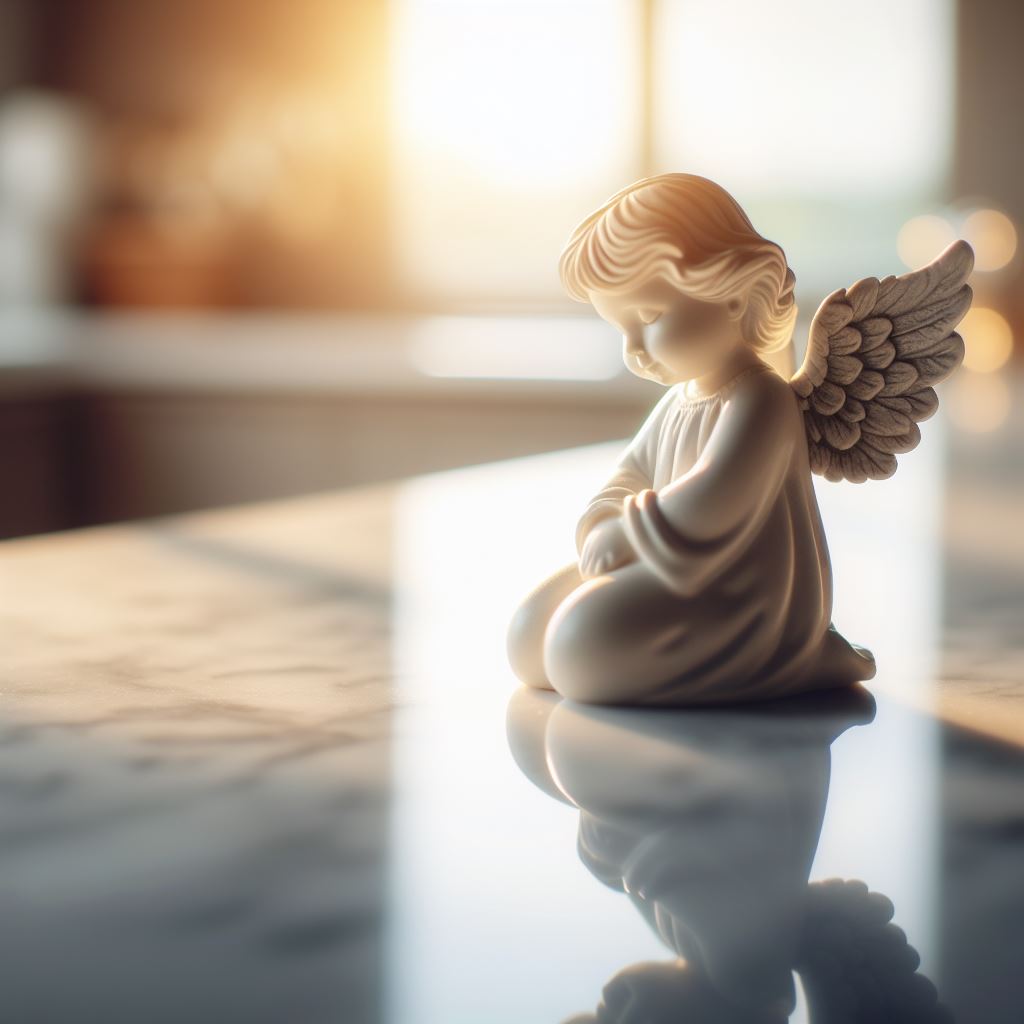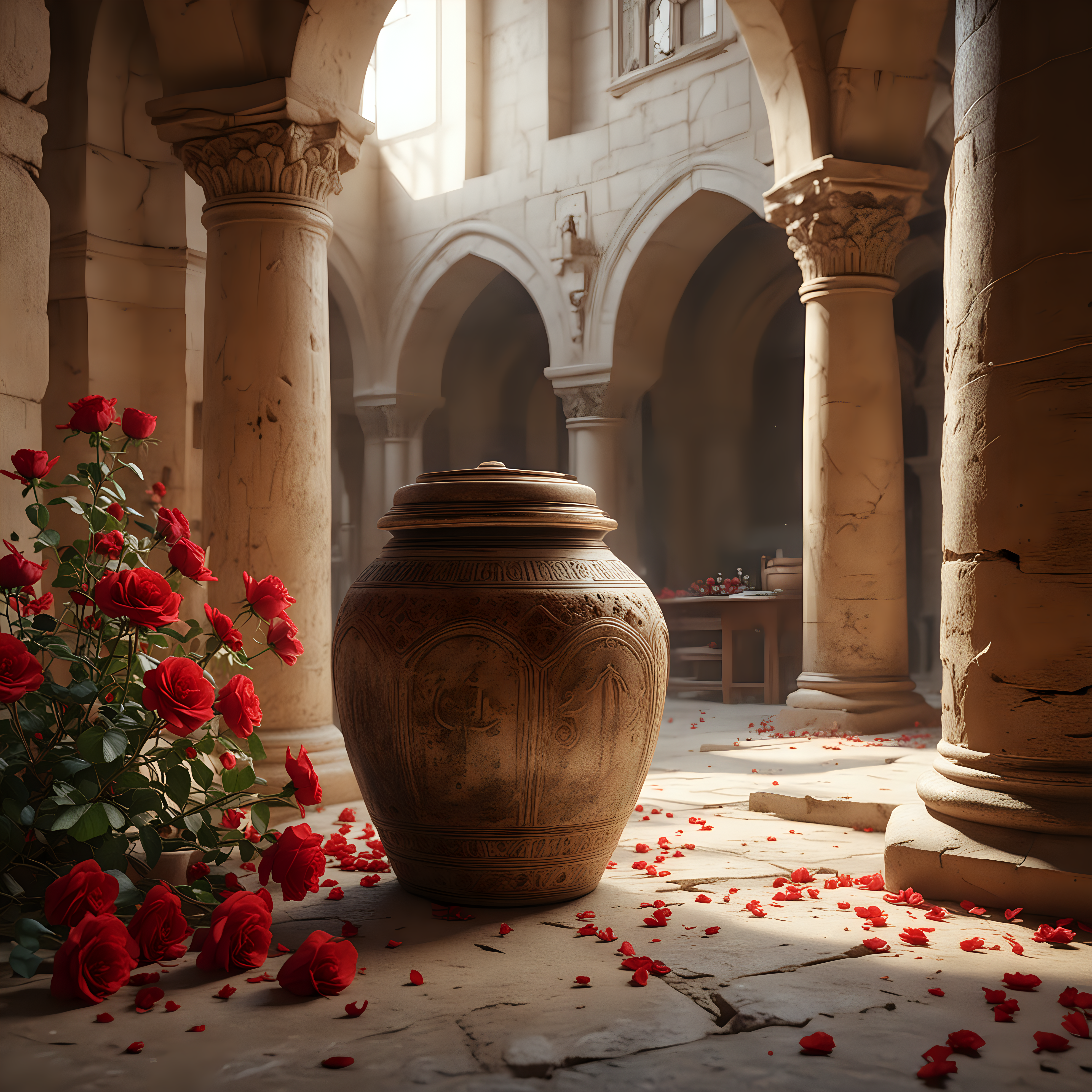I went for a walk during lunchtime today, a sunny Spring day on Vancouver Island. The Camellia trees were in full bloom, and cherry blossoms were dancing around like little fluffy pompoms. The locals call this time of year “Spring Winter” because the pink and red petals are blanketing the ground like snow. On a day like this, it’s impossible not to soak in nature’s beauty. The sun shining, birds singing, and a gentle breeze swaying through the trees—it all felt so uplifting, filling me with optimism and joy. It also reminded me of a couple of topics we had recently discussed in our exciting live class, “The Camino Experience”: Spiritual Consolation and the discernment of spirits.
The Camino Experience class, which you can rewatch at THECAMINOEXPERIENCE.LIVE, is like a little preview and orientation for our upcoming Camino trip in Spain, which is focused on the mystical teachings of St. Ignatius of Loyola. Ignatius emphasizes the discernment of spirits—determining when you are in a state of Spiritual Consolation versus Spiritual Desolation—as essential for finding inner peace and God, even in challenging moments.
So, in this post, you’ll learn:
- How to identify moments of Spiritual Consolation and what they mean for your personal growth.
- How to differentiate between mere emotional highs and profound spiritual experiences.
- Strategies for finding God and inner peace even when life feels challenging.
- St. Ignatius’ powerful practice for daily reflection and discernment.
- The reality behind “manifesting your dreams” and discerning genuine spiritual desires.
Benefits Of Recognizing Spiritual Consolation
Many of us are longing for spiritual depth and meaningful connection with God. This longing is the essence of Spiritual Consolation, which is what I felt during my Springtime stroll.
Spiritual Consolation reassures us that amidst the noise and distractions of our daily lives, finding moments of profound inner peace and clarity is both possible and incredibly valuable.
The basic idea is that inner peace arises from moments of Spiritual Consolation. Furthermore, if you can recognize these moments when they arise, you can draw upon them during more challenging times to stay connected to God in those moments and turn every such experience into an opportunity for spiritual growth.
Benefits of recognizing Spiritual Consolation include:
- Greater emotional resilience: You can face whatever life brings your way with a calm and centered heart.
- Greater clarity in your decision-making: You make decisions that are aligned with your true self.
- Improvements in well-being: Your overall mental health and emotional well-being feels stronger.
- A deepening of relationship: You have a deeper sense of connection with those around you and of belonging in the world.
- A heightening of gratitude: The things you already have bring you more joy and satisfaction.
- Overall personal growth: You gain insights into your relationship with God which help you develop spiritually.
- Creative inspiration: You are in touch with a new source of inspiration for bringing projects to fruition.
- Improvements in mindfulness: You naturally live more in the present, enriching your experience of everyday, ordinary life.
Ignatius Of Loyola’s Discernment Of Spirits
The “discernment of spirits” is referenced several times in the Bible as a kind of spiritual gift that allows one to discern spiritual people from non-spiritual people, or, more precisely, true prophets from false prophets. One example of this is from the Book of John:
“Dear friends, do not believe every spirit, but test the spirits to see whether they are from God, because many false prophets have gone out into the world. This is how you can recognize the Spirit of God: Every spirit that acknowledges that Jesus Christ has come in the flesh is from God, but every spirit that does not acknowledge Jesus is not from God. This is the spirit of the antichrist, which you have heard is coming and even now is already in the world.”
1 John 4:1-3
For Ignatius, however, the discernment of spirits is about something much deeper than this. See, Ignatius wanted something more than just the ability to acknowledge God’s presence in the world. He had read about the lives and experiences of the great Christian mystics that preceded him and he sought to walk the same path as them. He wanted to really feel God’s presence.
So, for Ignatius, the discernment of spirits is about discerning our own internal states: namely, discerning between Spiritual Consolation and Spiritual Desolation. But it’s not so simple as distinguishing the true from the false, good from evil, or Christ from antichrist. To really understand Spiritual Consolation, Spiritual Desolation, and the discernment of spirits, you should be prepared to leave behind that kind of dualistic thinking.
The Influence Of Inner States
During his period of solitary pilgrimage and prayer, Ignatius learned many valuable spiritual lessons, which he recorded in his now nearly 500-year-old book, The Spiritual Exercises. This book is a deeply valuable source of mystical wisdom, which is ultimately concerned with practical outcomes. In other words, the spiritual exercises are there to help you make good choices in life and become the person you were meant to be.
And so, one of Ignatius’ most important insights is that, depending on which spiritual state you’re in, you will interpret your whole reality through that lens. There’s a Daoist parable from the Book of Lieh Tzu that illustrates this:
“There was a man who lost an ax and suspected that the boy next door stole it. For the next few days he watched the boy’s movements and decided his behavior and looks were like those of a guilty person. Later, the man found the ax in a deserted area in the woods. When he got home, his neighbor’s boy no longer looked like a thief. Whether someone is guilty or not depends on your opinion of them in the first place.”
The Book of Lieh Tzu, Daoist text

In this case, you can see how this man’s suspicions created an inner state that colored his experience of the world around him. Had he not happened to find his ax in the woods, this inner state could have caused him to act rashly against the innocent boy.
It’s the same with the discernment of spirits. Our moods are always changing, but if you can acknowledge what your inner state is at any given moment, you will be able to better control your impulses and make more intentional decisions.
The Importance Of Inner Discernment
On its own, this is not ground-breaking stuff. You’ve likely had moments in life when you noticed your mood was shaping your experience of the world around you. Something great happens and it sends you skipping down the sidewalk; the warmth of the sun feels especially soothing and the grass looks a bit greener than normal. Or, the opposite happens: certain external conditions shape your internal state. On a rainy day, for instance, the gloomy scene outdoors makes you feel a bit more glum and lethargic.
In the same way, Spiritual Consolation and Desolation are both natural states that can arise for any number of reasons—and we all experience both states. Essentially, in moments of spiritual Desolation, you feel cut off from God. There’s emptiness, restlessness, or a disconnection from your sense of purpose. Desolation makes the world feel bleak and makes challenges seem insurmountable. Consolation, on the other hand, is a feeling of Oneness with God. You see the world in all its beauty and majesty. You feel as though you and everything else in the world are in exactly the right place at the right time. There is an alignment with your will and that of God.
Your experience of life really boils down to how well you can recognize and navigate Consolation and Desolation. The goal is to maintain a state of equanimity as much as possible—the sense of inner calm that comes from being rooted in something deeper than the ebb and flow of these fluctuations and external circumstances. It is in this state that we can make good decisions, act with Love, and be the best versions of ourselves.
How To Navigate Spiritual Consolation And Desolation
Obviously, one of these states sounds much more desirable than the other. And it is! But it’s no good equating Consolation with something like happiness and Desolation with unhappiness. If you do this, you’ll think that Desolation is something bad, something to avoid. But you’d be missing the point. It’s called “discernment of spirits” for a reason, rather than the “selecting of spirits” or the “controlling of spirits.” The point is that you will inevitably continue to experience both kinds of states throughout the rest of your life. There’s nothing you can do to change that. So, the important thing is not to struggle against states of Desolation or try to force moments of Consolation on command, but instead to be able to recognize the signs of each when they arise and have a plan ready for how to respond to each of those types of moments.
Remember when I said we’d have to leave behind dualistic thinking? Well, Hinduism is famous for its nondualistic philosophy and this quote, from the Bhagavad Gita, is a perfect example of this:
“They live in freedom who have gone beyond the dualities of life. Competing with no one, they are alike in success and failure and content with whatever comes to them. They are free, without selfish attachments; their minds are fixed in knowledge. They perform all work in the spirit of service.”
The Bhagavad Gita, Hindu text
A life of service is fueled by equanimity and equilibrium, so we have to recognize and respect both Consolation and Desolation, seeing them as two complementary sides of the same nondual coin.
What Does Spiritual Consolation Feel Like?
As I sat in the waiting room at the hospital before the first of my 32 grueling radiation treatments, the air felt thick with fear and uncertainty. I remember my knees literally trembling the way they do in cartoons. I was so afraid. But as I checked in at the front desk, utterly beside myself with terror, I noticed a small angel statue, no bigger than my thumb, sitting there on the counter.

What happened next was one of the most visceral experiences of God I’ve ever had. I heard a voice, a clear, deep reassuring voice that said, “I am with you.” That voice swallowed me into an ocean of calmness and inner peace. Without any effort on my part, I felt the fear drain from my knees and pour into the floor. I don’t know how much time went by. I think it was only a moment, but it seemed like forever and instantaneous at the same time. It was all very weird, but immensely comforting, and I will remember that moment forever.
Julian of Norwich, a mystic who lived through the black plague, sums up her experience of Spiritual Consolation with the simple mantra, “All shall be well, and all shall be well, and all manner of things shall be well.”
Spiritual Consolation is when your heart, at least for that moment, is beating in harmony with the Heart of God. It’s not an escape from your suffering. It is a heightened sense of the joy of being alive that enters your soul. You realize that your suffering is part of a greater whole. There’s a fullness in your heart, and all is well. You are content with the present moment and full of hope for the future.
How To Recognize Moments Of Consolation In Your Life
The first step in the discernment of spirits is to become aware of when Consolation is happening in you and what it feels like in your body while it’s happening. It’s actually something that happens a lot more often than you’d think. It’s not about the intensity of the emotion, but about the quality of connection and peace you feel during those moments.
I offered up the story of my moment of Spiritual Consolation in the hospital because the intensity of it makes it easier to understand what such a moment feels like. But these moments can be subtle and gradual as well, like my moment today.
Initially, I was simply enjoying the splendor of the cherry blossoms on this beautiful Spring day. But, as I allowed myself to become more present and immersed in the moment—I found myself transitioning from mere emotional happiness to a state of deep spiritual connection. It wasn’t abrupt but rather a gentle unfolding, like the blossoms themselves. What started out as an emotional experience of observing beauty turned into the recognition of something greater.
Beauty is a language through which The Divine whispers. And nature is one of the greatest modes of discourse this language has to offer. For me, the cherry blossoms became an experience of God’s presence in the beauty of nature.
Ask yourself right now: “When have I felt a peace that extends beyond me?” “What experiences have left me feeling deeply connected to everything around me?” “What gives me a deep sense of belonging in the world?” “What makes me feel alive?” These questions can guide you to recall times in your life when you experienced Spiritual Consolation, even if you didn’t recognize it as such at the time.
Emotional Versus Spiritual Consolation
One crucial thing to remember about Spiritual Consolation is this. Spiritual Consolation goes beyond moments of simple gratitude or contentment. It’s a deeper, more sustained state that arrests your whole being and changes your perspective towards life, even if just for a moment. As I said, not all moments of Spiritual Consolation are sudden and intense; sometimes they can be gradual and gentle. But by the same token, not all moments of sudden and intense joy or comfort are moments of Spiritual Consolation. There is a difference between an emotional high and a moment of Consolation, and understanding that difference is the essence of the discernment of spirits.
So, here’s the general criteria to keep in mind. With Spiritual Consolation, the epicenter of the experience is in God and not in ourselves. You can tell the difference between emotion and Consolation because, in Consolation, you are not the center of your experience. God is. It’s as if you’re granted a rare privilege of peeling back the layers of reality and getting a glimpse of how things are made and held together. When you see the truth, you are stunned by the perfection of it all.
Grappling With Spiritual Desolation
What’s most important about Spiritual Consolation is not what happens to you or how you feel just in those moments, but how they affect you going forward. Yes, it felt great to have the fear drain out of me in the hospital; and my afternoon was made more pleasant by my beautiful walk. But when you can draw upon those moments at a later time, especially during times of Spiritual Desolation, that’s when the full benefits of Consolation are really felt. Again, spiritual Desolation is natural and there is nothing wrong with it. Adversity is an important part of spiritual growth, as the Zen monk Shunryu Suzuki points out.
“So even though you have some difficulty in your practice, even though you have some waves while you are sitting [in meditation], those waves themselves will help you. So you should not be bothered by your mind. You should rather be grateful for the weeds, because eventually they will enrich your practice […] You will feel the progress. You will feel how they change into self-nourishment.”
Shunryu Suzuki, Zen monk and teacher
The point is not to become consumed by Spiritual Desolation to the point where you make misguided decisions based on fear or lose faith in God completely. That’s where spiritual Consolation comes in.
Next time you feel a wave of Consolation, pause and savor it. Recognize it as Consolation. Lingering in the experience will help you tap into it when you need strength. This is called Resourcing. You’re creating a reservoir of inner strength that you can draw from when you need it. It’s like keeping a little emergency food stash in your pantry in case of an earthquake or hurricane or some other hard-to-predict natural disaster. You don’t know when moments that trigger Spiritual Desolation will occur, but the more you do to prepare ahead of time, the better equipped you’ll be to keep your head above water and ride out the choppy waves.
St. Ignatius’ Prayer For Inner Peace and Calm

By lingering in Consolation, you’re anchoring the memory of it in your body. You’re essentially training yourself to call on Consolation no matter what circumstances arise. Because of how valuable this is, Ignatius developed one particular prayer technique called The Examen, which helps you recognize Spiritual Consolation in your life.
- 1) Become aware of the presence of the Divine: “God, I know at this moment I am in your presence and you are loving me, even if I can’t feel that fully right now.”
- 2) Review the day with gratitude: “God, you know my struggles, my strengths and what I need. Help to see how you’ve been with me over both yesterday and today.”
- 3) Pay attention to your emotions: “God, help me to be grateful for the moments when people have affirmed me and challenged me. Help me to see how I have responded. Have I been kind to others? Have I been open to growth?”
- 4) Choose one feature of the day and pray for softness. “God, I know you don’t expect me to be perfect. Help me to receive your love, despite my shortcomings. Help me to forgive myself, and to be kind to myself. Strengthen me. Encourage me. Guide me and continue to bless me.”
- 5) Look toward tomorrow: “As I look to the remainder of this day, make me aware that you are with me. Show me how to be the person I was born to be.”
Amen.
Manifesting Your Dreams
By cultivating your discernment of the spirits—paying attention to moments of Spiritual Consolation, acknowledging them, and cultivating gratitude for them—your awareness of future moments of Consolation in your life will become heightened. You’re creating a snowball effect that will result in more and more of these moments entering into your life, along with an ever-deepening reservoir of Consolation on which to draw when you need it most.
The net result is no different than that which people refer to as “manifesting.” The two practices go hand in hand. When you are in Consolation, you become spiritually receptive. It’s like you’re sending out a signal that says, “I’m ready for all the good things.” And God says, “Good things are already here and more are coming your way.” You’re not chasing your dreams; you’re living in a way that lets your dreams catch up to you.
It’s no wonder Vincent Van Gogh said, “I dream my painting and then I paint my dream.” In a state of Spiritual Consolation, you too are painting your dream, not with brush and canvas, but with your thoughts, feelings, and actions. In this state, it’s easy to be generous and empathetic. You’re more trusting and open. Everything’s a little more sparkly and beautiful. You feel at peace. And you make decisions based on Love and your connection with the Divine.
Frequently Asked Questions
Discernment of spirits can be viewed as a spiritual practice but also a general disposition. It was laid out in the mystical teachings of St. Ignatius of Loyola, who described discernment of spirits as the process and ability to, at any given time, recognize how close your innermost self is to God. Specifically, discernment of spirits involves discerning between spiritual consolation–periods of closeness to God–and spiritual desolation–periods of disconnection from God–both of which serve an important purpose in our spiritual lives.
St. Ignatius of Loyola prescribed one particular prayer technique called The Examen for tapping into inner peace by recognizing and fully appreciating moments of spiritual consolation, or particular closeness to God. Learn about The Examen and other insights into how to pray in the Wisdom of the Mystics Masterclass.
“God, I know at this moment I am in your presence and you are loving me, even if I can’t feel that fully right now.”
“God, you know my struggles, my strengths and what I need. Help to see how you’ve been with me over both yesterday and today.”
“God, help me to be grateful for the moments when people have affirmed me and challenged me. Help me to see how I have responded. Have I been kind to others? Have I been open to growth?”
“God, I know you don’t expect me to be perfect. Help me to receive your love, despite my shortcomings. Help me to forgive myself, and to be kind to myself. Strengthen me. Encourage me. Guide me and continue to bless me.”
“As I look to the remainder of this day, make me aware that you are with me. Show me how to be the person I was born to be.”
God gives us opportunities to cultivate true inner peace through moments of spiritual consolation, in which our spirit feels particularly close to God for a brief period. It can be as brief as a few seconds, but it can feel like an eternity. The important thing is to recognize those moments and embrace them as anchors in your spiritual journey, using them to guide your everyday life. By nurturing these connections, you cultivate a serene and resilient spirit, imbued with the lasting peace that only divine presence can provide.
Paragraph
Paragraph



